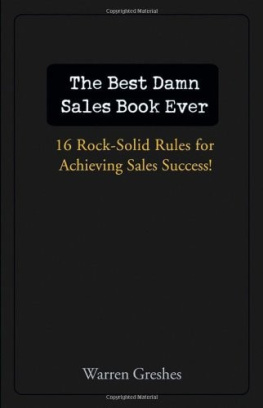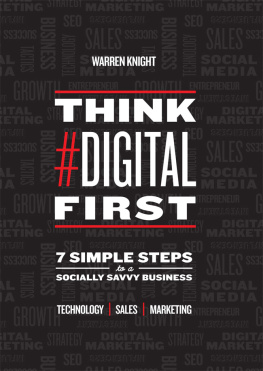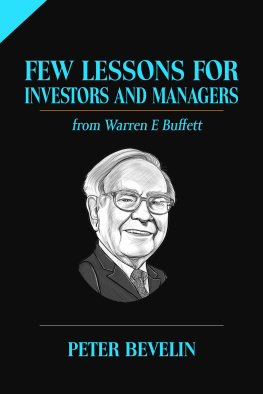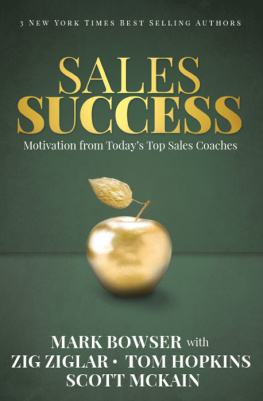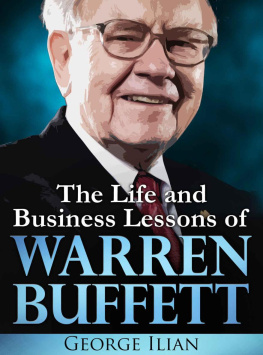Table of Contents
Copyright 2006 by Warren Greshes. All rights reserved.
Published by John Wiley & Sons, Inc., Hoboken, New Jersey.
Published simultaneously in Canada.
No part of this publication may be reproduced, stored in a retrieval system, or transmitted in any form or by any means, electronic, mechanical, photocopying, recording, scanning, or otherwise, except as permitted under Section 107 or 108 of the 1976 United States Copyright Act, without either the prior written permission of the Publisher, or authorization through payment of the appropriate per-copy fee to the Copyright Clearance Center, Inc., 222 Rosewood Drive, Danvers, MA 01923, (978) 750-8400, fax (978) 646-8600, or on the web at www.copyright.com. Requests to the Publisher for permission should be addressed to the Permissions Department, John Wiley & Sons, Inc., 111 River Street, Hoboken, NJ 07030, (201) 748-6011, fax (201) 748-6008, or online at http://www.wiley.com/go/permissions.
Limit of Liability/Disclaimer of Warranty: While the publisher and author have used their best efforts in preparing this book, they make no representations or warranties with respect to the accuracy or completeness of the contents of this book and specifically disclaim any implied warranties of merchantability or fitness for a particular purpose. No warranty may be created or extended by sales representatives or written sales materials. The advice and strategies contained herein may not be suitable for your situation.You should consult with a professional where appropriate. Neither the publisher nor author shall be liable for any loss of profit or any other commercial damages, including but not limited to special, incidental, consequential, or other damages.
For general information on our other products and services or for technical support, please contact our Customer Care Department within the United States at (800) 762-2974, outside the United States at (317) 572-3993 or fax (317) 572-4002.
Wiley also publishes its books in a variety of electronic formats. Some content that appears in print may not be available in electronic books. For more information about Wiley products, visit our web site at www.wiley.com.
Library of Congress Cataloging-in-Publication Data
Greshes, Warren, 1951
The best damn sales book ever: 16 rock-solid rules for achieving sales success / Warren Greshes
p. cm.
Published simultaneously in Canada
Includes index.
ISBN-13: 978-0-471-75728-3 (cloth)
ISBN-10: 0-471-75728-4 (cloth)
1. Sales personnelUnited States. 2. Sales personnelUnited StatesAttitudes. 3. Selling. 4. Success in businessUnited States. I. Title.
HF5438.25.G736 2006
658.81dc22
This book is dedicated to my wife Linda, who at times has had more faith in me than I did, and to my son Michael and daughter Emily, who are all part of the answer to the question:
What motivates the motivator?
Introduction
Being a salesperson is the best job there is. It is one of the few professions in which you can work for someone else and still be working for yourself. It is also one of the only professions where you can work for someone else, make as much money as you want, and not have to beg the boss for a raise.
A salespersons score is up on the board for all to see, every single day. Nobody can ever tell you youre doing a bad job if youre not. Of course, the down side is: If youre not doing a good job, theres nowhere to run, nowhere to hide. And therein lies the problem.
Most salespeople are not great at what they do. If we looked at every sales organization in the world, wed find, for the most part, they break down the same way. Ten percent of the salespeople are great; 10 percent should be kicked down the stairs and out the door; and the other 80 percent are merely average.
This book is aimed at two of those groups. The 10 percent at the top, while already successful, are the kind of people who are always looking to get better and can take one good idea and turn it into a veritable gold mine. The middle 80 percent need this book because they need direction. Most of them are mediocre not because they want to be, but because they just dont understand what it takes to be a successful salesperson.
Of course, if those in the bottom 10 percent want to buy this book, Im not about to stop them. But Im sure as heck not going to waste a lot of time, energy, and money marketing this book to that group. Theres a reason why the bottom 10 percent always seem to remain the bottom 10 percent.
Many sales books focus on some part of the actual sales processprospecting, closing, referrals, presentation skills, and so on. Others focus on certain psychological or supposedly new ways of selling: customer-centric selling; mirroring and understanding the personality of the customer; relationship selling.
While many of these skills are included in The Best Damn Sales Book Ever , this book is about what successful salespeople do to be successful. What makes it unique among sales books is that it starts at the very beginning of the process with the single biggest differentiator between the successful and unsuccessful salesperson: selfmotivation.
In fact, this book will teach you how to motivate yourself, by taking you through a process in which you will develop a written five-year plan for your life, career, and business. This five-year plan will enable you to focus more clearly on what you want to accomplish, when youll accomplish it, and the specific steps you will need to take to accomplish your goals.
Selling is rejection, plain and simple. The top salespeople can deal with it, the rest cant. Ask any sales VP or sales manager and theyll all tell you the same thing. The biggest reason their salespeople do not bring in enough business is that they dont see enough people. They dont see enough people because they fear rejection. They fear rejection because they dont know how much rejection they need. And they dont know how much rejection they need because they dont know what they need or want. They have no goals or plans for their lives, careers, or businesses.
After finishing this book, youll never be in that situation again.
There are a lot of fallacies about what constitutes a great salesperson. Oh, hes a great salesperson; he can talk you out of anything. Shes a born salesperson. She has a real sales personality.
As with so many other aspects of life, many peoples perceptions of what makes a great salesperson come from Hollywood. Both in the movies and on television, the great salesperson is always a con man type who can talk you out of anything. But how many times can one person talk you out of anything? Only onceand then youd never buy from that person again. Isnt the great salesperson the one who generates a tremendous amount of repeat business, which leads to bigger sales and more referrals?
Does it take a sales personality, as portrayed on television (outgoing, back-slapping, joke-a-minute), to be self-motivated, persistent, and willing to fill customers needs? No, of course not; that could be anyone. Herb Tarlick, the plaid jacket, white belt, white shoes salesman of the TV series WKRP in Cincinnati was not a good salesperson. In fact, he was an idiot.
This book will cover the following 16 rock-solid rules that successful salespeople follow:
1. They have a great attitude and always do more than theyre supposed to do.
2. They see themselves successful.
3. They dont prejudge; they dont assume; they dont minimize themselves, their prospects, or their clients.

